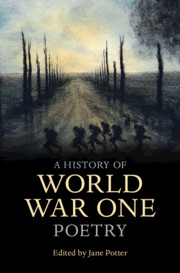Book contents
- A History of World War One Poetry
- A History of World War One Poetry
- Copyright page
- Dedication
- Contents
- Illustrations
- Contributors
- Acknowledgements
- Introduction
- Part I Literary Contexts
- Part II Nations and Voices
- Part III Poets
- Chapter 20 Non-Combatants
- Chapter 21 Edward Thomas (1878–1917)
- Chapter 22 Guillaume Apollinaire (1880–1918)
- Chapter 23 Siegfried Sassoon (1886–1967) and Edmund Blunden (1896–1974)
- Chapter 24 Anna Akhmatova (1889–1966)
- Chapter 25 Mary Borden (1886–1968)
- Chapter 26 Georg Trakl (1887–1914)
- Chapter 27 Isaac Rosenberg (1890–1918)
- Chapter 28 Ivor Gurney (1890–1937)
- Chapter 29 Wilfred Owen (1893–1918)
- Chapter 30 David Jones (1895–1974)
- Part IV
- Bibliography
- Index
Chapter 24 - Anna Akhmatova (1889–1966)
from Part III - Poets
Published online by Cambridge University Press: 18 January 2023
- A History of World War One Poetry
- A History of World War One Poetry
- Copyright page
- Dedication
- Contents
- Illustrations
- Contributors
- Acknowledgements
- Introduction
- Part I Literary Contexts
- Part II Nations and Voices
- Part III Poets
- Chapter 20 Non-Combatants
- Chapter 21 Edward Thomas (1878–1917)
- Chapter 22 Guillaume Apollinaire (1880–1918)
- Chapter 23 Siegfried Sassoon (1886–1967) and Edmund Blunden (1896–1974)
- Chapter 24 Anna Akhmatova (1889–1966)
- Chapter 25 Mary Borden (1886–1968)
- Chapter 26 Georg Trakl (1887–1914)
- Chapter 27 Isaac Rosenberg (1890–1918)
- Chapter 28 Ivor Gurney (1890–1937)
- Chapter 29 Wilfred Owen (1893–1918)
- Chapter 30 David Jones (1895–1974)
- Part IV
- Bibliography
- Index
Summary
Anna Akhmatova is a prominent presence in international canons of war poetry, yet her range and significance as a war poet remains underappreciated. Akhmatova is unique among Russian poets, given the Soviet emphasis on 1917 as historical watershed, in identifying 1914 in hindsight as the start of the ‘real’ twentieth century. This chapter situates Akhmatova’s tragic, patriotic view of war in its contemporary intellectual context, and in that of scholarship on gender and war poetry.It examines key lyrics, focusing on religious and pastoral motifs, and highlights Akhmatova’s distinctive approach through comparison with the poetry of her soldier husband, Nikolai Gumilev.Overall, it argues that the war marked an important transition in Akhmatova’s writing, allowing her to develop the characteristic blending of individual with collective voice – and ethical emphasis on memory and bearing of historical witness – that are commonly associated with her later work and which continue to resonate now.
Keywords
- Type
- Chapter
- Information
- A History of World War One Poetry , pp. 392 - 408Publisher: Cambridge University PressPrint publication year: 2023

